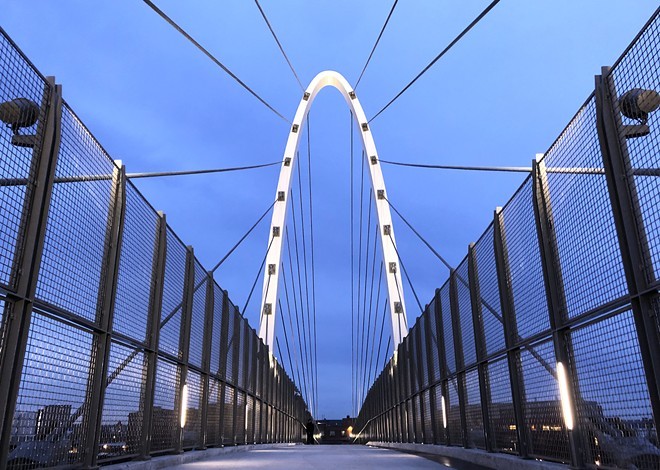Billig worries road diet will making biking to the U-District bridge more dangerous
Thursday, April 18, 2019

(as reported in The Inlander by Daniel Walters; photo caption: University District Gateway Bridge opened Friday, Dec. 14 to pedestrians and cyclists, connecting the University District and East Sprague; Photo by Derek Harrison.)
The University District Gateway Bridge, connecting East Sprague with the University District, was championed as a victory for pedestrians and cyclists. Which is why state Senate Majority Leader Andy Billig was so disappointed to see that the city was planning to make the section of Sprague Avenue that connected to the bridge less safe — at least temporarily — for cyclists.
The city, possibly with help from $3 million state transportation funding, plans to reduce the number of lanes on Sprague near the bridge from two lanes in each direction to only one.
"I generally support that road diet, but to do so without any accommodation for cyclists, makes that stretch less safe for anyone riding a bike," Billig says.
If they both have to share a lane, cars can be tempted to squeeze by cyclists with very little room to spare.
So far now, Billig is playing hardball: In the Senate transportation budget, he's put in a proviso, outlining that city of Spokane projects won't get any transportation funding until an infrastructure plan is completed and funding is identified for bike connectivity near the section of Sprague to the pedestrian bridge.
"It was never our intent to put bike lanes on Sprague," says city spokeswoman Marlene Feist. "What we're trying to do is accommodate multiple interests, neighborhood health, business health, bus access."
Feist and Billig point to a possibility, outlined in the Bike Master Plan, to put a bike trail behind the Sprague Avenue businesses, though the associated feasibility studies and right-of-way purchases could take time.
"My objection is that it's an afterthought," Billig says. "I believe that the city should put bike safety on the same level of priority as road redesign."
There's no guarantee that Billig's proviso will be in the final transportation bill. Billig and Feist both express optimism that a compromise will be reached.